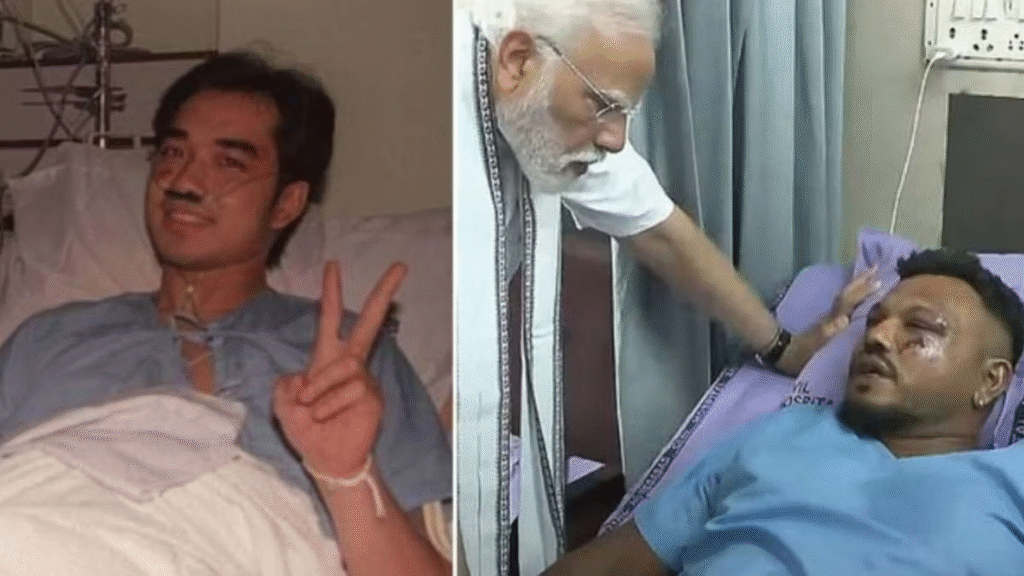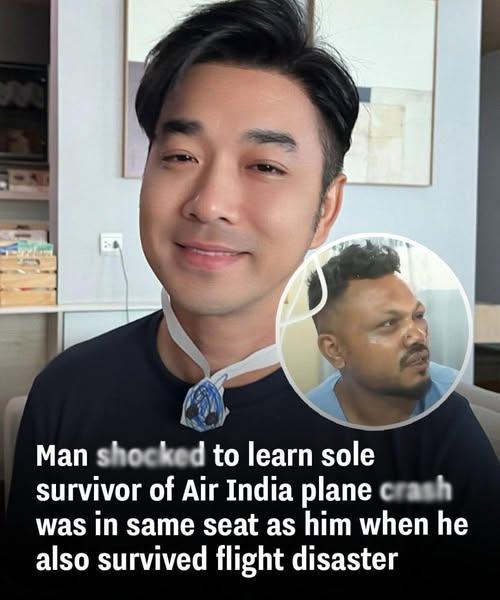In the wake of a devastating Air India plane crash that has shocked the world, a chilling coincidence has emerged—one that connects two survivors of separate, fatal airline tragedies through a single shared detail: seat 11A.
Authorities have now confirmed that eight passengers, including four medical students, lost their lives when the Air India aircraft went down in a horrifying incident captured on video, with a massive plume of smoke billowing into the sky as the wreckage exploded upon impact.
The flight, which was en route to London Heathrow Airport and scheduled to land at 18:25 BST, never made it. Instead, tragedy struck just moments after takeoff, with investigators revealing that a mayday call was issued from the cockpit seconds before the crash.
The aircraft’s final transmission:
“Mayday […] no thrust, losing power, unable to lift.”
While the official investigation remains ongoing, details continue to emerge—one of the most remarkable being the survival story of Vishwash Kumar Ramesh, a 40-year-old man from Leicester, England, who was the only person to make it out alive.
And incredibly, he was seated in seat 11A.
A Shared Seat, A Shared Fate

As the world absorbed news of Ramesh’s miraculous survival, another man—thousands of miles away—recognized something eerily familiar.
That man is Ruangsak Loychusak, a Thai singer and actor beloved for his roles in various TV dramas and for competing on Thailand’s version of The Mask Singer. Now 47, he came forward with a haunting revelation: he too had survived a deadly plane crash—and he too had been sitting in seat 11A.
Back in December 1998, Loychusak was one of the passengers aboard Thai Airways International Flight 261, a commercial airliner that stalled during its descent and crashed into a swamp in southern Thailand. The impact killed 101 of the 146 people on board, making it one of the deadliest aviation disasters in Thai history.
Miraculously, Loychusak was among the 45 survivors, pulled from the wreckage of the half-submerged aircraft after enduring a nightmarish ordeal.
“I couldn’t believe it when I heard the Air India survivor had been sitting in 11A,” he said. “That was my seat back in 1998. It gave me chills.”
“I Still Remember the Water in My Mouth”
For over two decades, Loychusak has quietly carried the trauma of his near-death experience. Though he rarely spoke publicly about it, the memories never faded.
“I can still remember the sounds, the smells, even the taste of the swamp water I swallowed when the plane crashed,” he said in a recent interview. “It’s stayed with me all these years.”
He described a decade-long struggle with air travel following the crash. Though air circulation was always normal, he confessed he often found it difficult to breathe.
“I avoided speaking to anyone on board. I would stare out the window and beg people not to shut it,” he said. “It was the only way I felt safe.”
His voice cracked as he shared what so many survivors of tragedy feel but cannot always express: “For a long time, I kept those feelings to myself.”
Now, in light of the recent disaster, his emotions have resurfaced—with a profound sense of empathy for Ramesh and those who didn’t make it out alive.
“I want to offer my deepest sympathies to the families who lost their loved ones,” he said. “I know that pain. I carry it with me.”
The Only Survivor Speaks
Meanwhile, Vishwash Kumar Ramesh, the lone survivor of the Air India disaster, is currently recovering in a hospital in Asarwa, Ahmedabad, India. Despite the physical injuries he sustained, he has already spoken at length about the ordeal.
According to hospital staff, Ramesh was conscious when he arrived and has remained stable.
While much of the public has focused on the tragedy’s death toll and the technical cause of the crash, Ramesh’s survival has become a source of wonder and inspiration. He was seated in row 11A, near the wing—an area that, in some crashes, offers either the worst or best chance of survival depending on the dynamics of impact.
Though Ramesh has yet to give a full media interview, preliminary reports say he has recounted crawling from the wreckage after the crash and managing to flag down first responders while in shock and covered in debris.
Prime Minister Modi: “Indescribable Loss”
In a public address, India’s Prime Minister Narendra Modi expressed sorrow and solidarity with the victims’ families.
“It’s indescribable that so many lives were lost in such a tragic and abrupt way,” he said. “India mourns together, and we offer our prayers and support to every grieving family. Om Shanti.”
Flags flew at half-mast in parts of India as the names of the victims were released. Among them were four medical students returning home from a university conference, and a married couple on their way to a family reunion in London.
What Happened to the Plane?
The cause of the crash is still under formal investigation, but the early mayday call offers critical insight. Pilots aboard the Air India flight reported an immediate and catastrophic loss of engine thrust shortly after takeoff. The lack of power prevented the plane from gaining sufficient altitude, causing it to drop rapidly before exploding on impact.
Experts note that incidents involving total thrust failure are exceedingly rare in commercial aviation. Black box data, radar logs, and maintenance records are being reviewed to determine whether a mechanical fault, pilot error, or external factor played a role.
The Strange Mystery of Seat 11A
The seat number 11A has now entered the conversation in a strangely mystical way.
For aviation experts, seat numbers don’t mean much. For survivors, they mean everything.
To some, the fact that two men—survivors of two different fatal crashes nearly 25 years apart—were both seated in the same spot on different aircraft may seem like eerie coincidence. To others, it may feel like something greater: fate, divine protection, or a strange cosmic reminder of life’s fragility and power.
As Ruangsak Loychusak put it:
“Maybe 11A isn’t just a seat. Maybe it’s a second chance.”
Plane crashes are rare—but when they do happen, they leave behind a trail of devastation, unanswered questions, and aching grief. Yet within that sorrow, stories like Ramesh’s survival—and Loychusak’s heartfelt connection—remind us of the human capacity to endure.
Two strangers. Two countries. Two different decades.
One seat: 11A.
And through it, two reminders of both the fragility and resilience of the human spirit.


